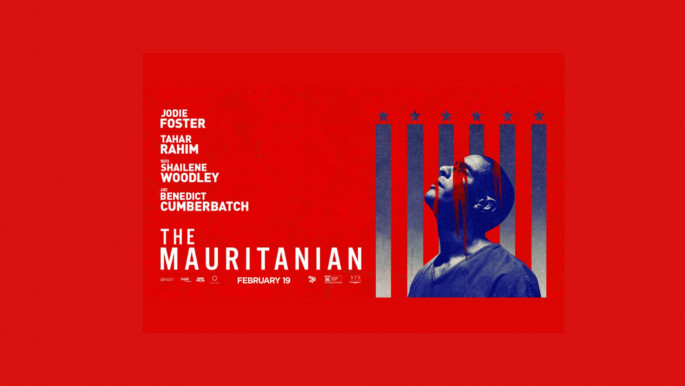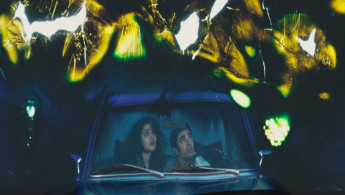Memory Box: Uncovering a painful past and moving forward
In their rich body of multimedia work, filmmaking duo Joana Hadjithomas and Khalil Joreige have widely explored the creation of images and representation, from the (re)construction of the imaginary to the writing of contemporary history, in the attempt to uncover Lebanon's forgotten, "hidden" past.
Their mission has not changed in their new feature, a drama entitled Memory Box, which took part in the main competitive strand of this year's online edition of the Berlinale (1-5 March 2021).
Read also: Justice, friendships, war and death: MENA films that wowed at the 2021 Berlin film festival
In detail, the script of Memory Box, penned by the two helmers along with Gaëlle Macé (Elle l'adore), follows a single mother called Maia (played by Rim Turki), who lives in an elegant apartment in Montreal with her teenage daughter, Alex (Paloma Vauthier).
On Christmas Eve, they receive a mysterious box from France. Maia seems aware of its content as she notices the return address. Thus, she puts it on a shelf and forbids Alex to open it. The girl doesn't know much about her mother's past and decides to ignore her order. Soon, we will understand that the package was sent by the parents of Liza, Maia's former classmate during her teenage years in Lebanon who recently died in a car accident.
The box, full of letters, photographs and cassette tapes, draws Alex back to the 1980s Beirut and her mother's life from around the time Maia was her age. Interestingly, the film's numerous flashbacks don't originate through simple editing transitions or juxtapositions.
 |
|
| Read also: The Mauritanian: Is Hollywood finally taking note of war on terror injustices at Guantanamo? |
Instead, Hadjithomas and Joreige choose to animate photos like a pop-up book before showing the actual live-action footage.
It's a playful choice which, together with many 1980s international hits ranging from artists such as Blondie, Sigue Sigue Sputnik, Visage and Killing Joke, lightens up the mood of a past difficult to narrate and uncover.
Teenage Maia (Manal Issa) experiences a struggle between her natural desire to be young and free and the emotional turmoil caused by her troubled family.
Her brother had recently been killed and both her parents are unable to cope with their loss. The father suffers from depression, whilst the mother (Nisrine Abi Samra) is on the verge of a nervous breakdown and her son's death made her hyper-protective.
In the backdrop, the country's civil war makes things even more complicated, forcing Maia to grow much faster than expected.
 |
Maia's memories sound genuine and moving, most probably because they've been significantly influenced by the real notebooks, photos and cassette tapes that Hadjithomas herself sent to a close friend who'd moved to France during the Lebanese civil war |  |
Maia's memories sound genuine and moving, most probably because they've been significantly influenced by the real notebooks, photos and cassette tapes that Hadjithomas herself sent to a close friend who'd moved to France during the Lebanese civil war.
Between 1982 and 1988, the two girls wrote each other every day. The theme of incommunicability is certainly not novel in dramas and coming-of-age films of this kind; however, the two directors manage to keep dialogues dry and bolster a simple mise-en-scène, cleverly avoiding easy clichés and other rhetorical trappings.
 |
|
 |
|
| Memory Box follows a single mother called Maia and her teenage daughter, Alex |
Their careful direction is particularly evident in the scenes following Maia and Alex's confrontation, when the woman finds out that her daughter has opened the box and the two slowly begin to get closer to each other.
At the margins of the narration, we can notice the presence of Alex's grandmother (Clémence Sabbagh), who embodies the oldest of the three generations portrayed in the film and still refuses to speak French, hinting at her reluctance to leave her war-torn country and a difficult integration process.
The ending of Memory Box is overall rewarding and uplifting; Maia is finally able to move forward and the narrative arc closes on a rather hopeful note, accompanied by the joyful vibes of Blondie's 1979 song One Way or Another.
All that remains now is for the audience to uncover how this process of catharsis takes place – and that's the most appealing part of this viewing experience.
Commendably, the picture also opens up wider questions: What impact do our memories – especially the most painful ones – have on our present? To what extent hiding our own "Pandora boxes" makes us estranged from our loved ones? How can we cope with loss and break the silence?
Therefore, the Lebanese socio-political context and Maia's family here serve as a universal example that speaks for the many "lost" individuals and communities that still struggle to (re)construct their memories and, thus, their history and identity.
 |
The Lebanese socio-political context and Maia's family here serve as a universal example that speaks for the many 'lost' individuals and communities that still struggle to (re)construct their memories and, thus, their history and identity |  |
Once again, Hadjithomas and Joreige gifts the viewers with a new, touching piece tackling the wounds of Lebanese society, in continuity with their previous features I Want to See (2008) and A Perfect Day (2005).
A solid script, an outstanding technical quality, an engrossing score (courtesy of Montreal-based musician Radwan Ghazi Moumneh) and a well-oiled female cast are the strongest ingredients of this French-Lebanese-Canadian co-production, one of the Berlinale titles worth watching as soon as it will be available in cinemas or on streaming platforms.
Davide Abbatescianni is an Italian film critic and journalist based in Cork. He works as a foreign correspondent for the EU-funded press agency Cineuropa, where he regularly writes about European cinema.
Follow him on Twitter @dabbatescianni



